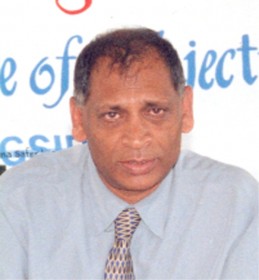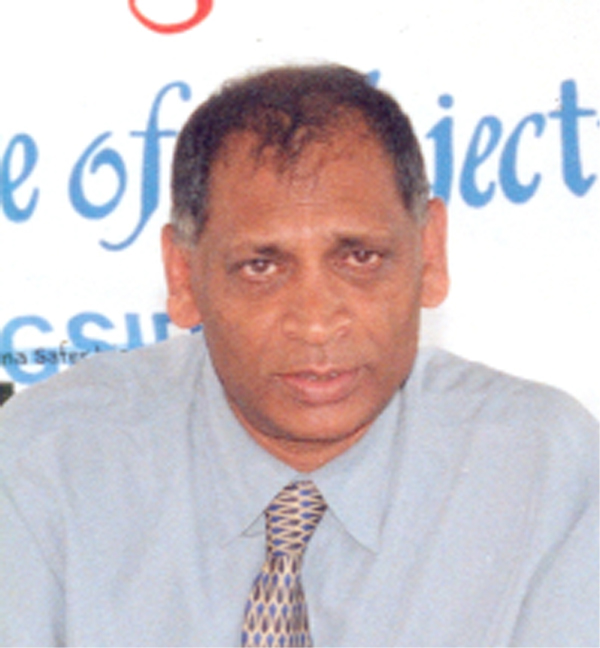President Bharrat Jagdeo yesterday rebuffed a call for the resignation of Health Minister Dr Leslie Ramsammy, after a letter surfaced purportedly showing that the minister confirmed government’s support for the acquisition of spy equipment later found in the possession of drug trafficker Roger Khan.

Jagdeo also maintained that an investigation of the allegations of a link between his administration and Khan’s activities here, including the illegal surveillance of officials as well as numerous murders, is the sole purview of the local police force. “I made it clear that this is responsibility of the police, from the first [instance] that we had the allegations and I asked them to seek information from the US government,” Jagdeo said, referring to claims that emerged from the US trial of former Khan lawyer, Robert Simels. He added, “There need not be any specific directive because the police has (sic) my support in any investigation that they will do into this matter–not just letters purported to be written by Leslie Ramsammy but the killings that took place in Guyana.”
Earlier this week, a letter surfaced bearing the letterhead of the office of the Health Minister as well as what appears to be Ramsammy’s signature. The letter, dated 2002, sought to confirm the Government of Guyana support for the acquisition of a “cell phone interceptor and geographic integrator,”–equipment subsequently seized from Khan. Ramsammy has denied knowing anything about the letter, which references “Acquiring the services of cell phone interceptor and geographic integrator,” and is dated October 24, 2002, just two months before the intercept equipment was seized from Khan and others by members of the joint services. It is addressed to someone named “Nancy.” Nancy Salvador has been revealed in court documents as being an employee of the spy shop in Miami, from where the equipment was sourced.
The letter prompted renewed calls by the main opposition PNCR for the minister to resign and for an international probe into alleged links between the Jagdeo administration and Khan.
But Jagdeo, noting that the minister has denied authoring the letter, said the issue is authentication. “So if a letter is circulated tomorrow, which says that one of my ministers wrote about something that is illegal and I am asked to get him to resign or to step aside based on that, I might not have a cabinet because letters can be fabricated, letters could be made up,” he explained.
Prior to the surfacing of the letter the President had told reporters: “But that’s it, we need to see the stuff. And even if he had done that, I don’t know if he had said he has not signed any such document, so we would have to… I don’t want to deal with hypothetical, I could deal with a hundred hypothetical [situations] but at this point in time what the government is committed to is to get the police to investigate . . .”
Asked about the government’s reluctance for an international inquiry, in the light of the charges of complicity with Khan levelled against the local law enforcement agencies, the President was adamant that the police force “is the sole authority in our land to investigate any criminality” and he maintained that the case dealt purely with allegations of criminality.
In 2004, allegations had been levelled against the then home affairs minister Ronald Gajraj, who was accused of involvement in the operation of a death squad. He temporarily stepped down from office to facilitate an investigation by a Presidential Commission of Inquiry, which later exonerated him but raised concern about his associations.
During that period there had also been calls for an international probe but the Office of the President argued that while the option of appointing international commissioners was examined, the availability of these persons would not have allowed for short-term functioning of the commission.
Jagdeo, however, was unwilling to draw parallels between the Ramsammy and Gajraj cases, saying the current allegations are very different. In the case of Gajraj, he noted that the allegations were specific to the police leadership and the minister. “In this case, we have allegations about police involvement,” he said, noting the implication of former members of the police force. At the same time, he added that while the force does have corrupt officers, they are routinely investigated and charged. “So, I don’t need a commission of inquiry to investigate criminality,” he said, “it’s a straightforward case of criminality and therefore the police are the only competent authority to do that, I don’t need any commission of inquiry.”
On Wednesday, the PNCR alleged that Ramsammy was tied “firmly” to the activities of Khan. “The Minister of Health must therefore resign his office forthwith,” the party declared in a statement, adding that the direct implication of the Jagdeo administration “raises serious and profound questions about the legitimacy of this administration and its moral right to rule.”
The PNCR also urged the international community to ensure that an international criminal investigation is launched to determine the extent to which the administration was involved in Khan’s criminal enterprise. “In making this demand the PNCR rejects any notion of an investigation by local law enforcement agencies for the simple reason that the government cannot investigate itself,” it added, while saying that the situation has brought about a “serious political crisis” and that only an international probe could restore stability and normalcy. “To further delay the launching of such an investigation will cause the situation to fester, further undermine the rule of law and lead to greater instability in this society,” the party further said.
On Monday when questioned about the letter, Ramsammy flatly denied any knowledge of it. “I don’t know anything about it,” he said. Further pressed on the issue and informed that the letter includes his ministry’s official letterhead with the ministry’s telephone numbers, he maintained his position: “Yeah but I don’t know anything. I don’t know where people are coming up with these things.”
Ramsammy was identified as having links to Khan by both US government witnesses and the defence at the recently concluded trial of t Simels. The revelations in the court flowed primarily from the testimony of Selwyn Vaughn, a paid US informant who said he was a member of Khan’s ‘Phantom Squad.’ Vaughn told jurors that Khan had connections to the government through Ramsammy.
Peter Myers, the Co-director of UK firm Smith Myers, testified under oath that the intercept equipment, including an intercept receiver and two laptops, was sold by the company’s Florida sales office through the Fort Lauderdale-based Spy Shop to the Guyana government. Meyers, who identified the equipment in court, said it was only sold to governments.
Simels’ defence identified Ramsammy as the purchaser of the equipment on behalf of the government. The letter is the first piece of physical evidence that implicates the minister. However, both the government and Ramsammy have continually denied the allegation.

